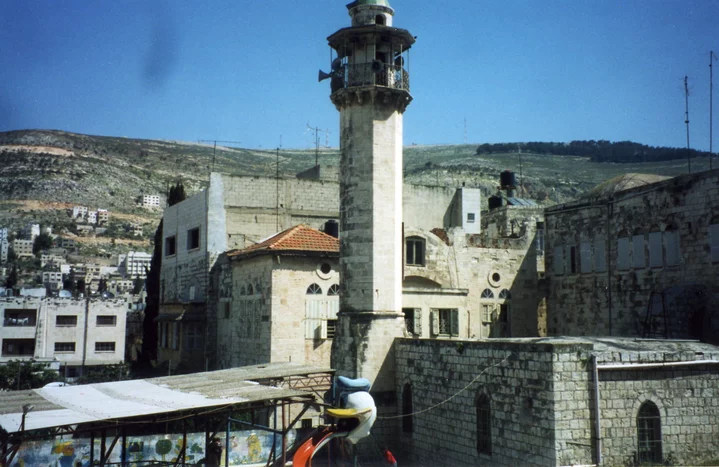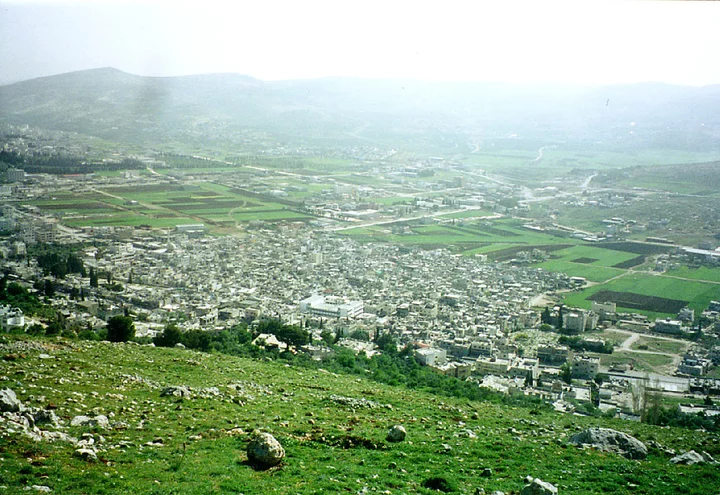In 2000, Louisa and I were staying in the old city of Nablus, in Palestine’s West Bank, which is about 60 miles east of Israel’s capital city Tel Aviv. For some reason now lost to time, I wanted to go there, assuming that a mere 60 miles could easily be traversed, despite the eternal antagonistic relationship between Palestine and Israel. Louisa, meanwhile, decided to head back to Jerusalem on her own — a simple matter, if you weren’t Palestinian.
I asked at a tiny travel office in the main square of Nablus if it was easy to get to Tel Aviv, and the guy made it sound simple: Get a sheroot (shared taxi) to Qalquilya, just inside Palestine, and from there it was a hop, skip and jump via taxi across the Green Line (the Israel-Palestine “demarcation”) to the Israeli city of Kfar Saba, From there bus to Tel Aviv. Easy peasy.
Nablus in 2000. Photos: Barry Evans.
Stage One was, indeed, simple. My sheroot wound though rolling farmland to Qalquilya, a small dusty Arab town. We stopped near what appeared to be the heart of the place, in a crowded yard full of old yellow (but green-plated, i.e. Palestinian) cabs. I had been chatting to a guy who spoke fair English, and asked him to help me find what I imagined to be a shuttle service across the Green Line. One driver quoted me the equivalent of $10 to drive me across the border and on to Kfar Saba. Ten bucks? For what looked like three miles on the map? Back then, still in my student “there’s always a cheaper way” frame of mind—a holdover from student hitching days, I balked.
I kept asking around, and finally another driver indicated that he’d take me to—well, I wasn’t sure exactly—for five shekels, less than two dollars. We zigged and zagged through town while I ruminated about the third-world look of the shops and pot-holed streets. After less than five minutes we arrived at the edge of town, beyond the shops and houses, and turned onto a dead-end dirt street that ended at an embankment topped by a guardrail running at right angles across the road.
My driver stopped and pointed. “Kfar Saba,” he said. I peered ahead, expecting to see a checkpoint. Nothing, no one. Then I realized that a narrow paved road ran on the other side of the guardrail, with no connection to the road we were on. I thought he had made a mistake, and that I was to get on this cross-street, but he pointed straight ahead. Apparently I was to cross this road, which I now realize was the Israeli-controlled border road, and head straight ahead to … again, I didn’t know.
I paid him and clambered up the embankment, over the guard rail, across the paved road, and followed a trail of sorts through some scrub, heading for another paved road I could see up ahead. In happier times, I suppose it had been an extension of the road on which the taxi had taken me. Ten minutes later I hit the pavement and looked around. Other than a couple of youths on bikes, it was deserted. A trailer stood off to the side of the road and I could hear music playing from nearby. I started walking, still unsure of my bearings. The young men, about 18 years old, saw me and rode up. “Kfar Saba?” I asked them, pointing ahead down the long, empty road. They got off their bikes and came intimidatingly close, one on each side. “Where you go?” asked the taller one. I noticed their features—dark, swarthy, and thought, “Sephardic.”
I dug the little piece of paper out of my pocket on which I’d written what the travel office guy had told me. “Kfar Saba,” I repeated. The tall one roughly grabbed the paper out of my hand, glanced at it, then rubbed his fingers together in the universal symbol for “money.” “No money,” I said, remembering I had about $200 in shekels and dollars, along with my passport, in my daypack. “Yes, money,” he insisted. They we touching me now, and one grabbed my pants pocket as if checking if I had money in there. I felt a bit weary, but strangely, in retrospect, not afraid. “I don’t have any money,” I lied, and started to move away. They blocked me. “Money!” one of them yelled at me. As it finally began to dawn on me that I could be in a difficult situation, a sharp voice rang out from the trailer. We all looked over to where a guy was coming out of the trailer door, looking angry as hell. I took advantage of the diversion and started walking ahead, while the youths yelled back at the guy. He looked big and mean, and I wanted out.
The yelling took on warlike proportions, and I looked back to see him tear the taller kid’s tee shirt off his body. “Fuck,” I thought (irrationally!), “Maybe I should go and protect my erstwhile robber.” I think I even made a move back, but trailer guy looked up and gestured for me to move on.
I headed down the road to the accompaniment of a full-scale argument behind me. A couple more men appeared from nowhere and they all seemed to be lecturing the youths with the subtlety of sergeant majors, screaming at the top of their voices. It seemed to take a long time to get out of earshot of the fracas, and finally fear kicked in as I realized I could have been in deep shit back there. Why hadn’t I been afraid? Had they got knives? Did I have any chance of outfighting or outrunning my two potential assailants? (No.) In my mind, I started to picture worst-case scenarios, and they weren’t pretty.
It was a long hot walk to a main road, where — finally — I saw a sign, in Hebrew and English, to Kfar Saba. I stood by the roadside under a baking sun hitching for what seemed forever, as dozens of cars shot by me. Finally one stopped and a guy took me to the bus station in Kfar Saba, lecturing me the whole time in English why it was dangerous to hitchhike in that war-torn part of the world.
And soon I was on a bus to Tel Aviv.


CLICK TO MANAGE